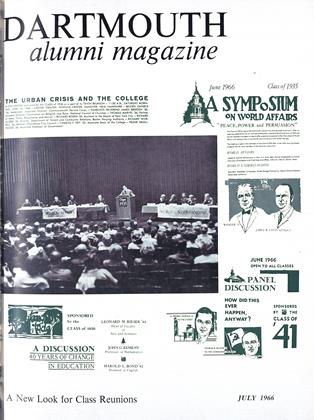THE FOUNDATIONS OF FREEDOM: THE INTERRELATIONSHIP BETWEEN DEMOCRACY AND HUMAN RIGHTS.
JULY 1966 KALMAN H. SILVBRTTHE FOUNDATIONS OF FREEDOM: THE INTERRELATIONSHIP BETWEEN DEMOCRACY AND HUMAN RIGHTS. KALMAN H. SILVBRT JULY 1966
By Durward. V. Sandifer andL. Ronald Scheman '53. New York: Frederick A. Praeger, Inc., 1966. 139 pp. $5.00.
True to its sub-title, this book convincingly argues that human rights sustain democratic forms, and that without democratic structures, human rights cannot be maintained. The authors point out that although that thesis seems axiomatic, it has been neglected in the academic literature, its "proof" left to the conventional wisdom of Western cultures but not to the explicit logical analysis of scholars and theorists. "Refreshing" is the adjective best describing this work. Cleanly written, nicely argued, and free of jargon even if imbued with a legalistic spirit, the book is an exercise in restrained libertarian passion. It should be read by conservatives and liberals alike as a statement of the premises of social cohabitation which have permitted advanced democratic nations to change with the times without undue institutional disruption.
Dr. Sandifer is well known in political science circles. As the dust jacket notes, "He served for 25 years in the Department of State and was Principal Adviser to Mrs. Roosevelt in the drafting of the U. N. Declaration of Human Rights." Mr. Scheman came to his task influenced by his work in Latin American affairs; he is now a member of the Department of Legal Affairs of the Pan American Union and Director of the Pan American Development Foundation. This background helps the study, for it enables the authors to handle the notoriously slippery contradiction in Latin American politics between the widespread profession of democratic belief and the practice of authoritarian rule. By emphasizing the Latin American experience, Sandifer and Scheman can submit their ideas to a hard test in that part of the Western world which still remains stubbornly and complexly out of fully modern status.
Perhaps the major point of the book is that a respect for human rights and the processes of democracy assist societies in their economic and social development. The reviewer in general agrees with this view, although it is certainly a minority one. The standard belief that underdeveloped countries must, by definition, be totally authoritarian is taken by most observers as selfevident. Although Sandifer and Scheman have gone some way to argue the contrary, by not emphasizing the dividends of rationality flowing from pragmatic democratic politics, and by assuming lineality of change (they say, first politics and then the rest, while nearly everyone else says first economics and then the rest), they fail to be ultimately convincing. When they depart from the core of their thesis, they also sometimes fall into easy generalizations of doubtful validity. For example, it simply is not true that "Ideals, repeated often enough, do become realities." Let us be thankful that most irrational ideals eventually find their graves in the cemetery of logical testing. And let us be sad that sometimes the death is so lingering.
But it would be unjust to emphasize these selvage edges of the book's central idea. It is a useful and pleasing addition to the literature on a universal aspect of man's social being. In combining competence with insight and a clean style, the authors have made their thoughts available to the wide public whose continued personal enrichment depends on their taking to heart the duties and the benefits of a decent social life.
Professor of Government
 View Full Issue
View Full Issue
More From This Issue
Books
-
 Books
BooksFACULTY PUBLICATIONS
June, 1923 -
 Books
BooksRights and Wrongs
JANUARY/FEBRUARY 1984 By Charles M. Culver, M.D. -
 Books
BooksRENAISSANCE LITERARY CRITICISM,
November 1945 By HERBERT F. WEST '22 -
 Books
BooksDEMOCRACY IN THE CONNECTICUT FRONTIER TOWN OF KENT.
October 1961 By HERBERT W. HILL -
 Books
BooksCREDIT UNION NORTH AMERICA
July 1941 By James F. Cusick -
 Books
BooksTHE THREAD OF ARIADNE: THE LABRYINTH OF THE CALENDAR OF MINOS.
DECEMBER 1972 By JOHN B. STEARNS '16







